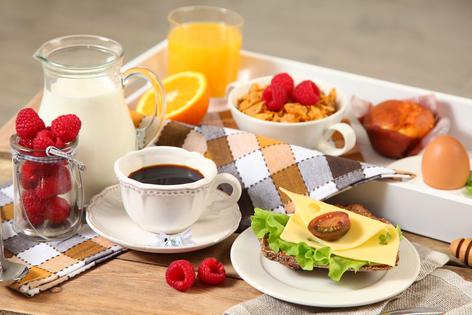The Kitchn: What is a continental breakfast, and what makes it continental?
Maybe you've stayed at a certain hotel specifically because you wanted the free continental breakfast. Maybe you visions of huge pancakes and fluffy egg dishes. And maybe you were disappointed when presented with your options: a small bowl of fruit, a tiny banana-nut muffin, and a mug of coffee.
To some, this might seem downright skimpy, especially if you're used to big, made-to-order options for your first meal of the day. To others, it might be just the right amount of food as they embark on their day.
Wherever you land on the divide, let's take a closer look at this popular option for travelers here in America and abroad, and see how this free meal came into fashion.
What is a continental breakfast?
The first known use of the term "continental breakfast" was in 1896 in "The Sanitarian," but the idea had been around for a few decades before then as American hotels made an effort to appeal to the changing tastes of both the emerging middle class and European travelers visiting America.
According to Merriam-Webster, a continental breakfast is defined as, "a light breakfast in a hotel, restaurant, etc., that usually includes baked goods, jam, fruit, and coffee." What do these items have in common? They're all shelf-stable items in portion sizes that are perfect for large groups of people.
Where does the term come from?
The term "continental breakfast" originated in Britain in the mid-19th century. To the British, "the continent" refers to the countries of mainland Europe. A "continental breakfast" describes the type of breakfast you'd encounter in places like France and the Mediterranean. It's a lighter, more delicate alternative to the full English breakfast -- a heaping plate of eggs, bacon, sausage, toast, beans and roasted mushrooms and tomatoes.
Continental breakfasts were also a stark contrast to American-style breakfasts, which boasted large helpings of eggs, breakfast meats, pancakes, potatoes, and toast. Europeans recoiled at the American-style breakfast, which they found too heavy and far too greasy. They preferred much more modest breakfast fare like fruit, bread, and pastries. So hotels aimed to please their more refined palates.
Why do hotels offer it?
Not only are these items more cost-effective for hotels -- you don't need much staff to tend to a few trays of bagels, pastries, and carafes of orange juice in the lobby -- but it's also easier to manage than, say, cranking out omelets and flapjacks to order. (Of course, some hotels do serve a much larger, more involved, free breakfast.) And guests like the convenience of the food and the perceived value of getting something "for free."
Why is it free?
In the traditional American payment model, hotel guests enjoyed all their meals in the hotel's restaurant. The price of the meals was included in one bill (room and board) at the end of their stay.
However, as guests preferred making cheaper and more flexible dining arrangements, hotels started adapting a European-style plan where meals were no longer folded into the cost of their stay. Guests only paid for their room.
Eventually, a hybrid plan emerged. It was called the "continental" model to set it apart from the other pricing structures. (It also sounds super fancy.) At a continental-style hotel, breakfast was now touted as being included with the price of the room, but guests were free to make their own arrangements for lunch and dinner. This model is now the standard in most hotels worldwide.
So next time you're at a hotel and you nibble on a complimentary blueberry muffin while sipping your free coffee and reading your free newspaper, you'll know how it all came about.
(Anna Goldfarb is a contributor to TheKitchn.com, a nationally known blog for people who love food and home cooking. Submit any comments or questions to editorial@thekitchn.com.)











Comments